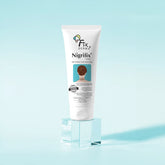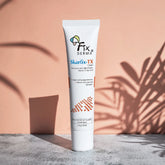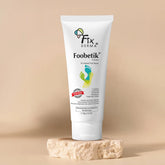Ingredients That Should Be Avoided For Sensitive Skin

Have you ever wondered why an itchy or burning sensation is felt when you apply a product to the skin? Well, the underlying reason can be your skin type, which means that you have sensitive skin!
Approximately 60% of women and 40% of men have sensitive skin and are prone to skin issues like rashes, inflammation, dryness, burning, etc. Sensitive skin requires special attention for this very reason. Knowing which components to avoid will help most individuals to overcome their sensitive skin woes. Today’s blog is a comprehensive guide to harmful skincare ingredients and tips for managing sensitive skin effectively.
What is sensitive skin?

The skin condition where the skin reacts aggressively to external factors that result in irritation such as redness, inflammation, rashes, dryness, flare-ups, scaling, etc. are signs to identify sensitive skin.
People with thinner skin barriers i.e., sensitive skin have to remain extra cautious with their skincare routine and the skincare products they apply. Thus, a prescription-based skincare regimen is always recommended by dermatologists to tackle sensitive skin woes.
The following indicators can be utilized to identify the people with sensitive skin:
- Quicker reactions: Sensitive skin is prone to quicker reactions and these reactions can flare up in the form of redness, inflammation, itchiness, and flaky skin.
- Redness and rashes on skin: In a few cases, the skin becomes red after an allergic reaction and the blood vessels dilate to become evident.
- Easily triggered by external factors: When the skin is exposed to heat, wind, certain ingredients, etc, it exhibits symptoms of irritation.
- Sunburn: Sensitive skin is more vulnerable to damage caused by UVA, UVB rays, and heat, increasing the risk of sunburn.
Common Irritants for Sensitive Skin
In comparison to oily or dry skin, dealing with sensitive skin can be more difficult. People with thinner skin barriers, i.e., sensitive skin, must remain extra cautious with their skincare routine and the skincare products they apply. Thus, here’s a list of common irritants that should be avoided for sensitive skin:
- Added fragrances: Dermatologists advise using fragrance-free products on the skin as it is one of the most common skin aggressors. Several products that smell great have added fragrances that can irritate the skin causing redness, itch, and other allergic reactions.
- Alcohol: There are two types of alcohols; beneficial alcohols containing fat which helps in moisturization and simple alcohols(Ethanol, isopropyl alcohol, and denatured alcohol) that dry out the skin. Opt for alcohol-free products if you have dry skin to prevent dehydrated skin and irritation.
- Sulfates: Sodium lauryl sulfate (SLS) and sodium laureth sulfate (SLES) are the common, harsh chemical leathers found in cleansers, known to aggravate sensitive skin by increasing dryness. Sulfate-free cleansers will gently cleanse the skin while preserving its natural barrier.
- Salicylic acid: Used to treat irritation and remove debris from the skin, high concentrations of salicylic acid can have a reverse reaction on sensitive skin. Therefore, go for lower concentrations of salicylic acid and wait for the skin to adjust to the routine.
- Dyes & colours: Not all dyes & colours used in cosmetics are organic(natural or fruit-derived colorants). Synthetic dyes are prepared from coal, tar, petrol, heavy metals, etc that may irritate sensitive skin further. Additionally, they also clog the pores leading to breakouts on the skin.
- Parabens: Parabens are the ingredients that extend the shelf life of skincare products. Methylparaben, propylparaben, and butylparaben are a few common ones in the category that should be avoided. Choose products that have ‘paraben-free’ labels on them to protect your skin.
- Essential oils: Sensitive skin may have an allergic reaction to essential oils even though they are natural. To reduce photosensitivity of the skin, opt for products with a minimum essential oil content.
- Harsh exfoliants: Certain exfoliants and scrubs contain rough, granule-like ingredients that irritate sensitive skin. Hence, go for smooth exfoliants, specially designed for sensitive skin, under the supervision of a dermatologist.
- Formaldehyde: A common ingredient in soaps and shampoos, Formaldehyde irritates sensitive skin when used in higher concentrations.
- Phthalates: Phthalates are shelf-life and fragrance enhancers that may induce allergic reactions on sensitive skin.
- Polyethylene glycols or PEGs: PEGs are used to regulate the consistency of products. These substances, found in numerous skincare products like creams, lotions, and hair products, alter the sensitive skin's moisture content and irritate it further.
- Oxybenozone: Oxybenozone is a common ingredient in chemical sunscreen. However, its usage is restricted in a few places due to allergic reactions on the skin. As mineral sunscreen contains skin-friendly chemicals like zinc oxide and titanium oxide, it's the greatest option for those with sensitive skin.
- Petroleum-based ingredients: Moisturisers are products that mainly contain petroleum. These comedogenic (pore-clogging) products lead to breakouts and flare-ups on sensitive skin. Moisturizers that contain natural ingredients like aloe vera can be considered an excellent alternative.
- Glycolic acid: People with highly sensitive skin must not use glycolic acid in any case unless it is dermatologist dermatologist-approved. The chances of glycolic acid irritating the skin and worsening skin conditions like dryness are high.
- Retinoids: High concentrations of retinol on sensitive skin cause peeling and irritation on the skin. You can always switch to a milder substitute like ‘bakuchiol’ if necessary.
Skincare Tips for Sensitive Skin

- Always do a patch test: Always perform a patch test before introducing a new product into your routine This can be done by applying a small amount of product on the forearm, elbow, or behind the ear. To ensure that the product is not causing any irritation, wait for a full 24 to 48 hours.
- Choose hypoallergenic and non-comedogenic products: Look for products labeled ‘hypoallergenic’, specifically formulated for sensitive skin. Non-comedogenic products do not clog the pores on the skin, thereby reducing irritation and breakouts.
- No hot water on the skin: Use lukewarm water if necessary. The skin may become dry and flaky after being stripped of its natural oils by hot water.
- Regular moisturization: There are plenty of moisturizers available in the market. However, if you have sensitive skin, look for a hypoallergenic, fragrance-free moisturizer to keep your skin healthy and reduce irritation.
- Simplified skincare routine: Identify the ingredients and products that treat your skincare issues specifically and incorporate only those into your regimen. Fewer products will keep your skin safe from unnecessary, unhealthy reactions.
- Do not over-exfoliate: It's also important to minimize exfoliation in addition to eliminating harsh exfoliants from your skincare regimen. When sensitive skin is over-scrubbed, it irritates the skin, which results in breakouts and dryness from the skin's loss of lipids and proteins.
- Take your time to introduce new products into your skincare routine: ‘Start slow’ is the key when it comes to incorporating ingredients into a sensitive skincare routine. When introducing a new product into your routine, begin with lower concentrations and increase the concentration once your skin is adjusted to it.
- Stay away from triggers: Pay attention to what triggers your skin. This can range from a new cosmetic product to an environmental stressor like sunlight or wind.
- Never skip sunscreen: Let it be any time of the year, never miss sunscreen. Always apply a non-comedogenic, broad-spectrum sunscreen with a minimum SPF of 30 to keep your skin protected from sun damage. Reapply sunscreen every 2 hours to ensure better protection.
Safe Ingredients for Sensitive Skin

- Aloe vera: Best known for its soothing and moisturizing properties, aloe vera works well on sensitive skin to reduce inflammation and irritation.
- Colloidal oatmeal: Packed with Vitamin E, minerals, and antioxidants, colloidal oatmeal relieves skin irritations by retaining moisture content on the skin.
- Ceramides: Restores the disrupted skin barrier by repairing the bonds of the skin’s outer layer and improves skin health.
- Green tea: An antioxidant known for its anti-inflammatory properties.
- Shea butter: A natural emollient that moisturizes the skin reducing irritation.
- Glycerin: An excellent ingredient to retain moisture on the skin, and fight dry skin.
- Hyaluronic acid: A common ingredient in skincare products known to keep the skin hydrated.
- Niacinamide: (Vitamin B3) is known for its anti-inflammatory properties and ability to strengthen the skin barrier.
- Cica or Centella Asiatica: Cica is a small herbaceous plant rich in bioactive substances that helps to heal and nourish sensitive skin.
- Liquorice: Diminishes signs of damage and irritation with its anti-inflammatory effects.
Safe Ingredients for Sensitive Skin
Sensitive skin requires a safe, mindful skincare routine to avoid irritation and maintain a healthy complexion. Here’s a step-by-step routine by Fixderma for sensitive skin focusing on gentle products.
Step 1: Cleanser
Apply a small amount of Fixderma Non-Drying Cleanser or Fixderma Cleovera Face Wash on the skin gently massage the skin in circular motions and rinse well with water. This cleanser is a non-comedogenic product formulated especially for sensitive skin to cleanse the skin deeply. Enriched with potent ingredients, these pH-balanced cleansers maintain the natural skin barrier and moisture.
Step 2: Serum
Apply a few drops of Fixderma Vitamin C Serum on the skin after cleansing. Formulated with Vitamin C, Niacinamide, Retinol, and Ferulic acid, this serum is a great non-irritating choice to combat fine lines, and hyperpigmentation that promotes bright and healthy skin.
Step 3: Moisturizer
To lock in the ingredients and moisture on the skin, moisturizer is mandatory. Fixderma Cleovera Cica Cream is an effective and gentle moisturizer that comforts the skin while helping strengthen the skin barrier. It has anti-inflammatory properties that help to soothe and calm irritated skin.
Step 4: Sunscreen
While applying sunscreen always go for a broad-spectrum sunscreen with a minimum 30+ SPF. Fixderma SPF 50+ Cream Sunscreen is a non-greasy, non-comedogenic gel sunscreen that is hypoallergenic as well. It is safe for all skin types and protects your skin against both UVA & UVB rays without leaving a white cast.
Conclusion: Although managing sensitive skin can feel like a task, it can be accomplished with the appropriate approach to the skin. As a first step, identifying and avoiding the skin irritants will make this journey easier. Certain ingredients, environmental factors, lifestyle habits, etc irritate the skin. If you ever face an issue with identifying the right products and ingredients for the skin, consult a dermatologist for assistance.








